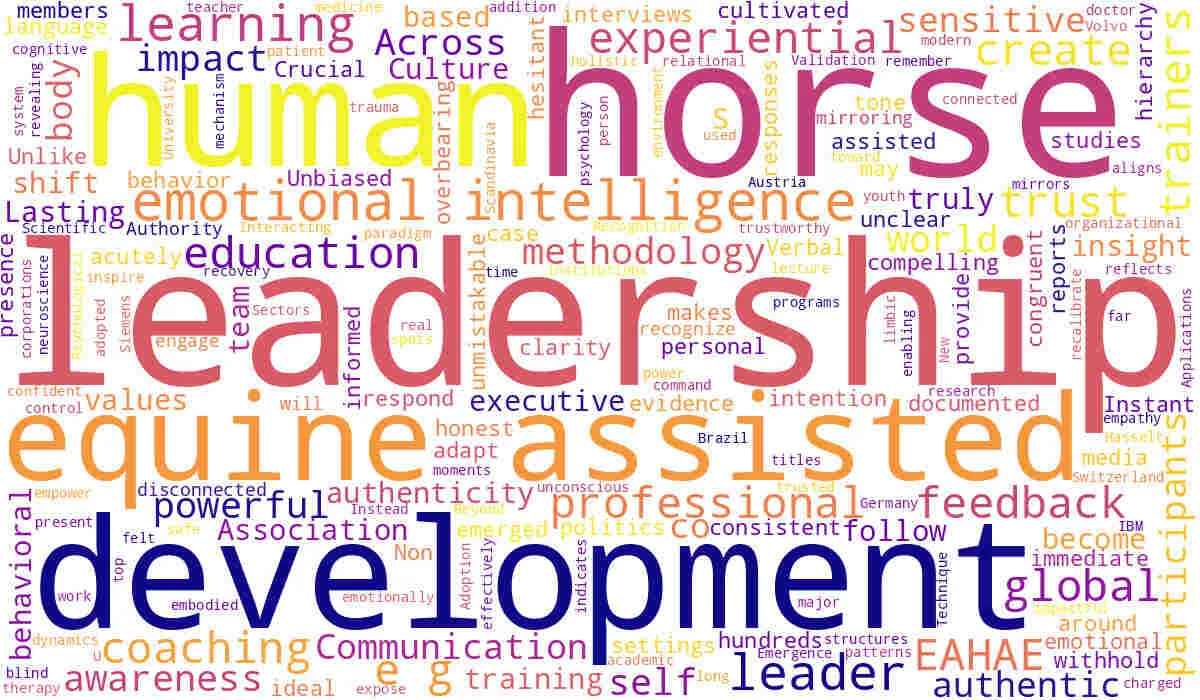
We collected press articles on Horse Assisted Education, Equine Assisted Leadership Development, Equine Assisted Learning etc., since 1998.
Conclusion (by ChatGPT)
Equine-assisted leadership and personal development coaching has emerged as a powerful, evidence-informed methodology for experiential learning. Across hundreds of documented case studies, media reports, and interviews with trainers, executives, and participants from around the world, the consistent and compelling impact of horses on human self-awareness, leadership behavior, and emotional intelligence becomes unmistakable.
Key Insights:
- Non-Verbal Communication is Crucial: Horses are acutely sensitive to body language, tone, intention, and presence. As such, they respond only to congruent, authentic leadership. This makes them ideal co-trainers in settings where clarity, trust, and authenticity are being cultivated.
- Instant, Unbiased Feedback: Unlike human team members who may adapt or withhold responses based on hierarchy or politics, horses provide immediate and honest feedback. If a leader is unclear, overbearing, hesitant, or disconnected, the horse will not engage, mirroring the impact such leadership would have on a human team.
- Trust Over Authority: Horses do not recognize organizational titles or power structures. Instead, they follow those who create a safe, confident, and trustworthy environment. This insight reflects a major paradigm shift in modern leadership from command-and-control to inspire-and-empower.
- Experiential and Lasting Learning: Interacting with horses creates emotionally charged, embodied learning moments that are far more impactful and long-lasting than cognitive, lecture-based training. Participants remember what it felt like to be truly present, trusted, and connected.
- Global Adoption and Recognition: From Germany, Austria, and Switzerland to Brazil, the U.S., and Scandinavia, equine-assisted programs are being adopted by top corporations (e.g., IBM, Siemens, Volvo), academic institutions (e.g., Hasselt University), and professional associations (e.g., EAHAE).
- Leadership Development Beyond Technique: Horses expose not just what leaders do, but who they are—revealing unconscious patterns, emotional blind spots, and relational dynamics. This creates a more holistic development of the leader as a person, not just as a professional.
- Applications Across Sectors: In addition to executive development, equine-assisted coaching has been used effectively in education (teacher training), medicine (doctor-patient communication), therapy (trauma recovery), and youth development.
- Scientific and Psychological Validation: The methodology aligns with neuroscience, behavioral psychology, and emotional intelligence research. The horse’s feedback mechanism mirrors the human limbic system, enabling leaders to recalibrate in real time.
- Emergence of a New Leadership Culture: This body of work indicates a shift in the global leadership culture toward values such as self-awareness, emotional intelligence, empathy, and authenticity—all qualities horses require to follow human leadership.
- The Role of EAHAE and Professional Trainers: Organizations like the EAHAE International Association for Horse Assisted Education (EAHAE) have created global networks and standards, ensuring professionalization and the continuous evolution of the field.
Transformation
Equine-assisted coaching is not a fringe trend or alternative gimmick. It represents a powerful convergence of experiential learning, emotional intelligence, behavioral science, and authentic leadership development. Horses are not metaphorical props; they are sensitive, responsive co-facilitators that help humans uncover who they truly are when they lead—and how they can become better, more conscious versions of themselves.
In a world that increasingly values transparency, trust, and emotional intelligence in leadership, equine-assisted education offers not just insights—but transformation.
